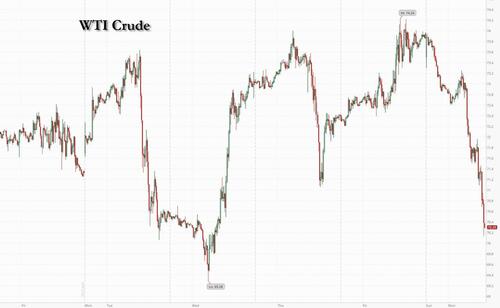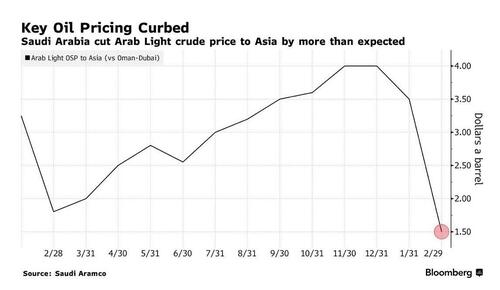
Oil is plunging this morning, sending WTI on the verge of sliding below $70...
... after Saudi Arabia reduced the price of its crude oil for February delivery for all buyers amid what Bloomberg dubbed "persistent weakness", rather than just Asian ones as it has done before.
State producer Saudi Aramco reduced its flagship Arab Light price to Asia by $2 to $1.50 a barrel above the benchmark. That’s bigger than a $1.25 a barrel reduction estimated in a Bloomberg survey of refiners and traders.
Interestingly, Aramco also cut the price for North American buyers by the same amount, while in previous price adjustments it has cut these prices more modestly according to OilPrice. For European buyers, Aramco cut February prices by between $1.50 and $2 per barrel.
"Saudi crude is still relatively more expensive compared to other regional crude. But we are happy enough to see such prices, making it much more affordable for us," a source from a refinery in North Asia told Reuters in comments on the news.
The news outlet noted that the price cut is the deepest in 13 months and suggests a softer Asian market for crude. A month ago, a survey by Bloomberg among refiners suggested Aramco will cut prices amid intensified competition for the Asian market and cheaper crude from the United States and Europe, as well as Guyana.
Oil from the US had become especially attractive as an alternative to Middle Eastern crudes as Brent crude came near parity with the Dubai benchmarks against with these crudes are prices. The cause of that unusual development was OPEC production cuts.
Meanwhile, just two months ago, Aramco raised the prices of its crude for most of its buyers. For Asian buyers, this was the fifth price increase for the flagship Arab Light in a row as Saudi Arabia curbed output to stimulate higher prices.
OPEC agreed at the end of last year to reduce production of oil this quarter by 2.2 million barrels daily. So far, this has not prompted any worry about short supply, keeping prices relatively stable. Many traders seem to believe that even a cut of 2.2 million bpd—if all comply—would be enough to offset greater supply from non-OPEC producers.
Oil is plunging this morning, sending WTI on the verge of sliding below $70…
… after Saudi Arabia reduced the price of its crude oil for February delivery for all buyers amid what Bloomberg dubbed “persistent weakness”, rather than just Asian ones as it has done before.
State producer Saudi Aramco reduced its flagship Arab Light price to Asia by $2 to $1.50 a barrel above the benchmark. That’s bigger than a $1.25 a barrel reduction estimated in a Bloomberg survey of refiners and traders.
Interestingly, Aramco also cut the price for North American buyers by the same amount, while in previous price adjustments it has cut these prices more modestly according to OilPrice. For European buyers, Aramco cut February prices by between $1.50 and $2 per barrel.
“Saudi crude is still relatively more expensive compared to other regional crude. But we are happy enough to see such prices, making it much more affordable for us,” a source from a refinery in North Asia told Reuters in comments on the news.
The news outlet noted that the price cut is the deepest in 13 months and suggests a softer Asian market for crude. A month ago, a survey by Bloomberg among refiners suggested Aramco will cut prices amid intensified competition for the Asian market and cheaper crude from the United States and Europe, as well as Guyana.
Oil from the US had become especially attractive as an alternative to Middle Eastern crudes as Brent crude came near parity with the Dubai benchmarks against with these crudes are prices. The cause of that unusual development was OPEC production cuts.
Meanwhile, just two months ago, Aramco raised the prices of its crude for most of its buyers. For Asian buyers, this was the fifth price increase for the flagship Arab Light in a row as Saudi Arabia curbed output to stimulate higher prices.
OPEC agreed at the end of last year to reduce production of oil this quarter by 2.2 million barrels daily. So far, this has not prompted any worry about short supply, keeping prices relatively stable. Many traders seem to believe that even a cut of 2.2 million bpd—if all comply—would be enough to offset greater supply from non-OPEC producers.
Loading…






